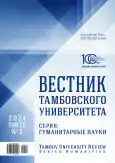Soft skills development in the process of teaching “Tourism” students a foreign language
- Authors: Bortnikova T.G.1, Dolzhenkova M.I.1
-
Affiliations:
- Derzhavin Tambov State University
- Issue: Vol 29, No 2 (2024)
- Pages: 368-377
- Section: THEORY AND METHODS OF FOREIGN LANGUAGE TEACHING
- URL: https://bakhtiniada.ru/1810-0201/article/view/297858
- DOI: https://doi.org/10.20310/1810-0201-2024-29-2-368-377
- ID: 297858
Cite item
Full Text
Abstract
Importance. Soft skills formation as a part of teaching a foreign language to students of the educational direction “Tourism” contributes to communication skills, empathy, creativity and flexibility of thinking, which are necessary in their future professional activities. The purpose of this study is: 1) analysis of the goals of teaching a foreign language and their correlation with the process of developing hard and soft skills; 2) conducting an empirical study to test the possibility of developing soft skills when teaching a foreign language; 3) identification of significant issues related to the interpretation and use of various cultural codes in communication activities. Attention is focused on the fact that behavioral stereotypes can be variably interpreted depending on which linguistic and cultural communities the communicants belong to. It is emphasized that familiarity with the cultural codes of the studied language and trainings on the development of soft skills can significantly improve the decoding and communicative abilities of students in the process of working with the material for creating advertising texts of tourist destinations and excursion programmes.Materials and Methods. The experiment is carried out at Derzhavin Tambov State University with the aim of compiling on its basis fragments of research based on the relevance of the topic, a review of scientific literature (definitions and experimental data published in this field of knowledge), selection of bibliography and results’ analysis of its experimental verification. The experiment is based on the use of foreign languages teaching methods. The criteria for selecting educational material are texts related to the popularization and advertising of tourist destinations and step-by-step training is aimed at developing soft skills within the framework of game-based educational activities.Results and Discussion. Step-by-step training has shown its success in solving a number of assigned tasks. Students become more flexible in the communication process, showing the correct reactions in accordance with the situation and the target audience, the skills of formulating and implementing communication goals are developed (in such aspects as informational, informative, normative), choosing and using established constructs within the framework of the relevant situation, analysis and synthesis of the results of the dialogue.Conclusion. Based on the results of the experiment, the conclusion is made about the significant didactic potential for soft skills formation within teaching a foreign language. The cognitive and affective aspects of student training have been identified, contributing to the soft skills development. Specific stages of work are proposed, combining various forms of presenting information, professional competence and maintaining successful dialogue with different linguistic and cultural groups in a foreign language.
About the authors
T. G. Bortnikova
Derzhavin Tambov State University
Email: tatyana_bort@mail.ru
ORCID iD: 0000-0003-2947-9409
Dr. habil (Culturology), Professor, Professor of Foreign Philology and Applied Linguistics Department
33 Internatsionalnaya St., Tambov 392000, Russian FederationM. I. Dolzhenkova
Derzhavin Tambov State University
Author for correspondence.
Email: dolgenkovam@mail.ru
ORCID iD: 0000-0001-7656-7028
Dr. habil. (Education), Professor, Head of Cultural Studies and Social and Cultural Projects Department
33 Internatsionalnaya St., Tambov 392000, Russian FederationReferences
- Beisenova A.Zр., Shapieva G.E., Zhassulan E. (2015). Teaching English as means of English communication by mastering practical goals. Nauka i mir = Science and World, no. 5-2 (21), pp. 43-44. (In Russ.) https://elibrary.ru/twnwdp
- Vovsi-Til’e L.A. (2018). Modern goals of teaching foreign languages in a non-linguistic university. Pedagogi-cheskii zhurnal = Pedagogical Journal, vol. 8, no. 3A, pp. 132-137. (In Russ.) https://elibrary.ru/xymndn
- Bukarova A.V., Abdrafikova A.R. (2016). Diskursivnaya kompetentsiya kak tsel’ v obuchenii inostrannomu yazyku [Discursive competence as a goal in teaching a foreign language]. Pedagogicheskii opyt: teoriya, meto-dika, praktika [Teaching Experience: Theory, Methodology, Practice], no. 1 (6), pp. 31-32. (In Russ.) https://elibrary.ru/vonskd
- Lushnikova I.I. (2017). Teaching a foreign language for general purposes to students of non-linguistic faculties: specificity, problems, solutions. Filologicheskie nauki. Voprosy teorii i praktiki = Philology. Theory & Practice, no. 1-1 (67), pp. 204-206. (In Russ.) https://elibrary.ru/xelttd
- Almabekova O.A. (2012). Changing objectives in teaching foreign languages for professional purposes due to new social requirements. Fundamental’nye issledovaniya = Fundumental Research, no. 3-3, pp. 548-552. (In Russ.) https://elibrary.ru/pazbbh
- Fomina T.P., Kuznetsova E.V. (2022). Soft skills of students in working with scientific literature. Sbornik iz-brannykj statei 6 Vserossijskoi (s mezhdunarodnym uchastiem) nauchno-prakticheskoi konferentsii «Aktual’nye problemy teorii i praktiki obucheniya fiziko-matematicheskim i tekhnicheskim distsiplinam v sovremennom obrazovatel’nom prostranstve» [Collection of Selected Articles of the 6th All-Russian (with International Participation) Scientific and Practical Conference “Actual Problems of Theory and Practice of Teaching Physics, Mathematics and Technical Disciplines in the Modern Educational Space”]. Kursk, Kursk State University, pp. 262-266. (In Russ.) https://elibrary.ru/bhjuig
- Sorokopud Yu.V., Amchislavskaya E.Yu., Yaroslavtseva A.V. (2021). Soft skills and their role in training mod-ern. Mir nauki, kul’tury, obrazovaniya = World of Science, Culture, Education, no. 1 (86), pp. 194-196. (In Russ.) https://doi.org/10.24412/1991-5497-2021-186-194-196, https://elibrary.ru/rtnnim
- Raitskaya L.K., Tikhonova E.V. (2018). Perceptions of soft skills by Russia’s university lecturers and students in the context of the world experience. Vestnik Rossiiskogo universiteta druzhby narodov. Seriya: Psikhologiya i pedagogika = RUDN Journal of Psychology and Pedagogics, vol. 15, no. 3, pp. 350-363. (In Russ.) https://doi.org/10.22363/2313-1683-2018-15-3-350-363, https://elibrary.ru/ybjiff
- Stepanova L.N., Zeer Eh.F. (2019). Soft skills as predictors of students’ life self-fulfillment. Obrazovanie i nauka = Education and Science Journal, vol. 21, no. 8, pp. 65-89. (In Russ.) https://doi.org/10.17853/1994-5639-2019-8-65-89, https://elibrary.ru/sqyixp
- Zaliznyak A.A., Levontina I.B., Shmelev A.D. (2005). Klyuchevye idei russkoi yazykovoi kartiny mira [Key Ideas of the Russian Language Picture of the World]. Moscow, Languages of Slavic Cultures Publishing House, 544 p. (In Russ.) https://elibrary.ru/pvxtnd
Supplementary files









